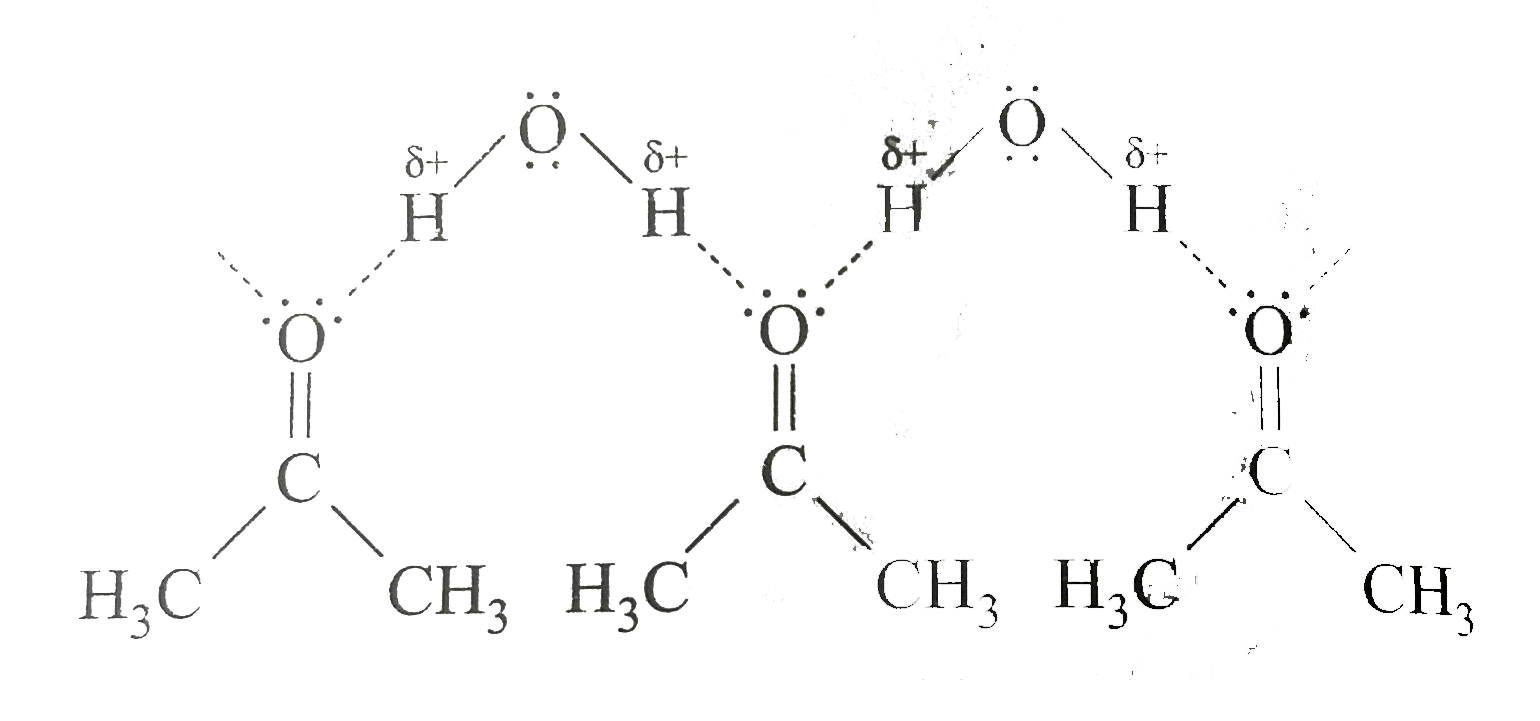Which of the following is correct
I Water and octane are essentially in one another
II Water acetone are miscible
III LiCl is highly soluble in water, less solube in acetone and does not dissolve at all octane
IV Naphthalene is virtually insoluble in water
I,II,III,IV
I,II,III
II,III
III,IV
The correct Answer is:1
Octane is a nonpolar hydrocarbon found in gasoline while water is a highly polar hydrogen-bonding solvent. Octane can't from hydrogen bonds, so there is no good way for the molecules of these two substances to intract strongly with each other.
There are no favorable solute-solvent interactions to compensate for the solute-solute attractions and solvent-solvent attractions that must be overcome if the solute is to disperse in the solvent. Thus, octane and water are not miscible.
II. Acetone is an organic solvent. Its molecule, CH3−O∣∣C−CH3, has a relatively negative oxygen atom that can form a hydrogen bond with the hydrogen of water

Thus, water and acetone are miscible. Acetone and octane are also miscible because the interactions between molecules of octane and acetone are similar in magnitude to those between molecules of acetone or of octane alone, since aceton can't form hydrogen bonds with it self. When acetone and octane are mixed there is nothing to prevent the molecules of the two substances from mixing freely.
III. Lithum chloride (LiCl) is an ionic, highly polar salt. It is most soluble (about 80g/100gH2O) in water, the polar solvent for several reasons. The attractive foeces between the anions and the cations of LiCl are reduced in water because of the high dielectric constant of water. In addition, ion-dipole attractions occure between the Li+ cations and the relatively negative oxygen stoms of the water molecules. Hydrogen bonding between the Cl− anions and the water molecules also occures. These favorable solute-solvent interactions more than compensate for the loss of the attractions in pure water and pure LiCl (i.e. an ionic solid dissolves in water because the attractions between the polar molecules and the ions making up the crystal lattice of the solid are greater than the attractive forces that hold the lattice together).
LiCl is less soluble in acetone (about 5g/100gofacetone). The acetone molecules do not interact as favorably with dissolved ions as do H2O molecules, and acetone has a lower dieldctric constant than water.
Finally, LiCl does not dissolve at all in acetone, because there are no favorable interactions between the charged ions of LiCl and the nonpolar molecules of octane.
The behavior of a nonpolar hydrocarbon solute such as naphthalene, C10H8 (mothballs) is opposite to that of an ionic salt. Naphthalene, a solid dissolves in octane becomes the interactions between molecules of naphthalene and molecules of octane are similar in magnitude to those between molecules of naphalene alone or of octane alone.
Naphthalene is less soluble is acetone as there are some polar attractions between molecules of acetone, and naphthalene does not interact well enough will acetone to compensate for the loss of these attractions.
Naphthlene is virtually insolublr in water. There are no favorable attractions between water molecules and non-polar naphthalene molecules to compensate for the energy required to break the strong hydrogen bonds between the water molecules.
Topper's Solved these Questions
- SOLUTIONSBOOK - R SHARMACHAPTER - SOLUTIONSEXERCISE - FOLLOW-UP TEST 5
9 Videos
- SOLUTIONSBOOK - R SHARMACHAPTER - SOLUTIONSEXERCISE - FOLLOW-UP TEST 6
13 Videos
- SOLUTIONSBOOK - R SHARMACHAPTER - SOLUTIONSEXERCISE - FOLLOW-UP TEST 3
5 Videos
- SOLID STATEBOOK - R SHARMACHAPTER - SOLID STATEEXERCISE - Archives
28 Videos
- STEREOCHEMISTRYBOOK - R SHARMACHAPTER - STEREOCHEMISTRYEXERCISE - Archives
17 Videos
Similar Questions
Knowledge Check
From the following compounds, the one which is the best highly soluble in water is
AFormaldehydeBAcetaldehydeCPropionaldehydeDButyraldehydeWhich one of the following when dissolved in water, gives a solution with pH less than seven at 298 K ?
ACH3COCH3BC6H5OHCC6H5NH2DC2H5OHWhich of the following show an increase in entropy?
I Boiling of water
II Melting of ice
III Freezing of water
IV Formation of hydrogen gas from water.A(I) and (II)BOnly (III)C(I) ,(II) and (IV)D(III) and (IV)
Amongst the following compounds, identify which are insoluble, partially soluble and highly soluble in water
(ii) toluene
View SolutionGive reasons:
(i) p-Nitrobenzoic acid and higher Ka value than benzoic acid.
(ii) Acetone is highly soluble in water but benzophenone is not.
View SolutionWhich of the following is (are) an endothermic process(es)?
(i) Dilution of sulphuric acid
(ii) Sublimation of dry ice
(iii) Condensation of water vapours
(iv) Evaporation of water
View SolutionWhich of the following is (are) an endothermic process(es) ?
(i) Dilution of sulphuric acid (ii) Sublimation of dry ice
(iii) Condensation of water vapours (iv) Evaporationof water
View SolutionWhich of the following are not electromagnetic waves?
(i) sound waves (ii) radiowaves
(iii) X rays (iv) water waves
View Solution
